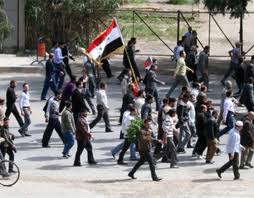
 Tens of thousands of Syrian protestors took to the streets in what was dubbed the “Great Friday” protests. VOA has reported that 75 people were killed on Friday while Reuters pegs the number at almost 90. Two MPs from Deraa, Naser al-Hariri and Khalil al-Rifaei, resigned today, Saturday, in protest against the killings. The BBC reported: One of the resigning MPs, Naser al-Hariri, told al-Jazeera TV: “After I have failed to protect my sons from the treacherous shots there is no point in me staying in parliament.” The second MP, Khalil al-Rifaei, said he could not “protect the people who brought me to parliament”, and urged President Assad to intervene to stop the violence.
Tens of thousands of Syrian protestors took to the streets in what was dubbed the “Great Friday” protests. VOA has reported that 75 people were killed on Friday while Reuters pegs the number at almost 90. Two MPs from Deraa, Naser al-Hariri and Khalil al-Rifaei, resigned today, Saturday, in protest against the killings. The BBC reported: One of the resigning MPs, Naser al-Hariri, told al-Jazeera TV: “After I have failed to protect my sons from the treacherous shots there is no point in me staying in parliament.” The second MP, Khalil al-Rifaei, said he could not “protect the people who brought me to parliament”, and urged President Assad to intervene to stop the violence.
Reuters quoted U.S. President Barack Obama’s reaction to the news of Fridays killings: “This outrageous use of violence to quell protests must come to an end now. Instead of listening to their own people, President Assad is blaming outsiders while seeking Iranian assistance in repressing Syria’s citizens through the same brutal tactics that have been used by his Iranian allies.”
Opinion
Despite the concessions (see Wikipedia: List of Concessions) including the liftng of the emergency law by the current government, the Syrian protests seemed to have reached some sort of critical mass. Even though the ruling the Ba’ath Party led by President Bashar al-Assad is cracking down and doing so hard, the demands for change and the demands for Assad to go are not dying down. With today’s resignation of two MPs in protest over the killings of civilians, will the groundswell of support manage to duplicate what happened in Tunisia and Egypt?
ABC News quoted U.S. Defense Secretary Robert Gates, “Regime change imposed from the outside, as we have seen in Iraq and in the Balkans, is incredibly difficult and works best, as we have seen in Tunisia and Egypt, when it is done from within.”
When a government starts killing its own people en masse, sooner or later the government (that is the people making up the government) is going to revolt against itself.
Al Jazeera – Apr 23/2011
Violence continues in Syria
It has been another bloody day in Syria where security forces have fired on protests and funerals for some of those killed on Friday. A local human rights group says 120 people have died during the last two days. That has caused widespread outrage, with three high profile officials in the city of Daraa resigning live on Al-Jazeera.
Euronews – Apr 23/2011
Mourners shot at by Syrian soldiers – witnesses
Syrian security forces have reportedly opening fire on mourners attending funerals for scores of people killed during yesterday’s anti-government rallies. At least three people are said to have been shot dead. Activists claim nearly 90 civilians died on Friday as demonstrations against the country’s authoritarian rule were held up and down the country in cities such as Homs, Hama and the capital, Damascus.
References
Wikipedia: 2011 Syrian protests
The 2011 Syrian protests are a series of major protests taking place in Syria, which began on 26 January 2011, influenced by concurrent protests in the region. The protests have been described as “unprecedented”. Hundreds of protesters and security personnel have allegedly been killed, and many more injured, in the largest protests to take place in the country for decades. United Nations Secretary-General Ban Ki-moon condemned the use of deadly force against protesters as “unacceptable”. Syria has been governed under an Emergency Law since 1962, resulting in the effective suspension of most constitutional protections for citizens. President Hafez al-Assad was in office for nearly 30 years, while his son, President Bashar al-Assad, has been in office since 2000.
Wikipedia: Timeline of the Syrian protests
22 April The Great Friday
For the first time, major demonstrations occurred in Damascus itself. Other cities where protesting was particularly strong were in Daraa, Banias, Qamishli, and Homs. The Douma and Harasta sections of Damascus were particularly filled with protesters. Firing throughout the country resulted 88 deaths among security forces and protesters, making it the bloodiest day so far.
Click HERE to read more from William Belle
Article viewed at: Oye! Times at www.oyetimes.com

Be the first to comment